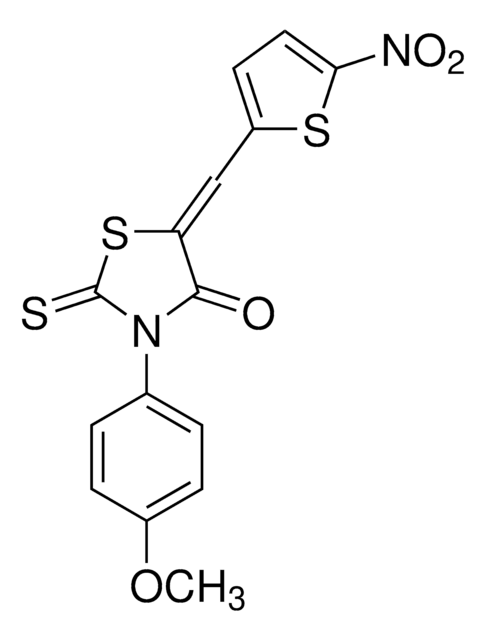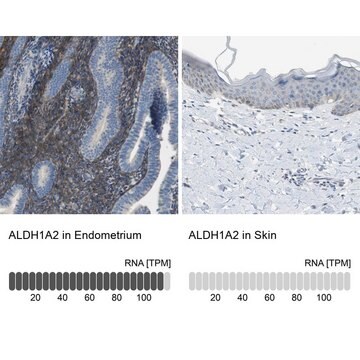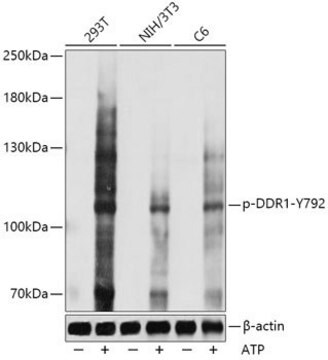SML1832
DDR1 Inhibitor 7rh
≥98% (HPLC)
Sinónimos:
4-Ethyl-N-(3-((4-methylpiperazin-1-yl)methyl)-5-(trifluoromethyl)-phenyl)-3-(pyrazolo[1,5-a]pyrimidin-6-ylethynyl)benzamide, 7rh
About This Item
Productos recomendados
Quality Level
assay
≥98% (HPLC)
form
powder
color
white to beige
solubility
DMSO: 10 mg/mL, clear
storage temp.
2-8°C
SMILES string
O=C(NC1=CC(C(F)(F)F)=CC(CN2CCN(C)CC2)=C1)C3=CC=C(CC)C(C#CC4=CN5C(N=C4)=CC=N5)=C3
InChI
1S/C30H29F3N6O/c1-3-23-6-7-25(16-24(23)5-4-21-18-34-28-8-9-35-39(28)20-21)29(40)36-27-15-22(14-26(17-27)30(31,32)33)19-38-12-10-37(2)11-13-38/h6-9,14-18,20H,3,10-13,19H2,1-2H3,(H,36,40)
InChI key
DDLPXZXBWGJRGK-UHFFFAOYSA-N
General description
Biochem/physiol Actions
Compound 7rh is a potent, high affinity (Kd =0.6 nM), ATP-competitive inhibitor against discoidin domain-containing receptor 1 (DDR1; IC50 = 6.8 nM, [ATP] = 100 nM) with significantly reduced potency toward 455 other kinases, including DDR2, Bcr-abl, and c-Kit (IC50 = 101.4 nM, 355 nM and >10 μM, respectively). Inhibitor 7rh reduces DDR1 expression/phosphorylation and downstream signaling in a dose-dependent manner (0.1-2 μM; NCI-H23 NSCLCs), effectively suppressing human cancer cells proliferation (IC50 from 38 nM/K562 to 2.98 μM/NCI-H460) and colony formation (IC50 = 0.56 μM/NCI-H23). Inhibitor 7rh is orally availabe in rats and mice (T1/2 = 15.53 h; Tmax = 4.25 h; Cmax = 1867.5 μg/L, F = 67.4%; 25 mg/kg; rats) and displays in vivo efficacy against Kras (LSLG12Vgeo) tumor growth in mice (50 mg/kg/day p.o.).
Storage Class
11 - Combustible Solids
wgk_germany
WGK 3
flash_point_f
Not applicable
flash_point_c
Not applicable
Elija entre una de las versiones más recientes:
Certificados de análisis (COA)
¿No ve la versión correcta?
Si necesita una versión concreta, puede buscar un certificado específico por el número de lote.
¿Ya tiene este producto?
Encuentre la documentación para los productos que ha comprado recientemente en la Biblioteca de documentos.
Nuestro equipo de científicos tiene experiencia en todas las áreas de investigación: Ciencias de la vida, Ciencia de los materiales, Síntesis química, Cromatografía, Analítica y muchas otras.
Póngase en contacto con el Servicio técnico








